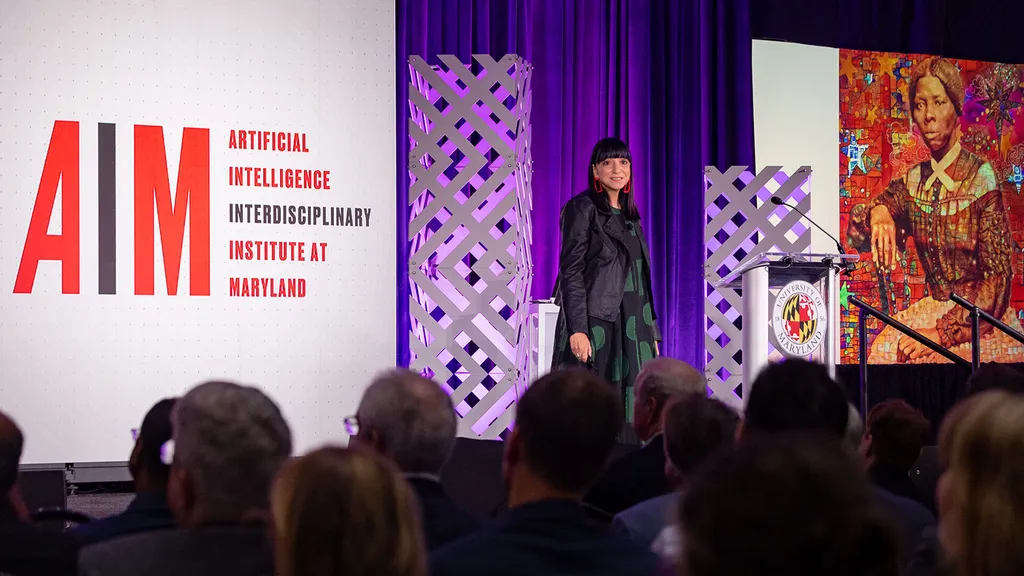- May 06, 2024
- By Jessica Weiss ’05
Neda Atanasoski's previous job as a professor at the University of California, Santa Cruz, gave her a front-row seat to the early 2010s tech boom in nearby Silicon Valley, and what she called its alarming "exacerbation of poverty and inequality." Though she didn't start her career focused on technology, the juxtaposition of wealth and need in the cradle of modern computing resonated deeply.
Now a professor and chair of the University of Maryland’s Harriet Tubman Department of Women, Gender, and Sexuality Studies, Atanasoski recently took on another leadership role: as associate education director for UMD’s new Artificial Intelligence Interdisciplinary Institute at Maryland (AIM). The institute launched in April as a collaborative hub to support faculty research and offer innovative and experiential learning opportunities to boost the field’s workforce and inspire new generations of leaders dedicated to AI that helps solve societal problems.
While placing a humanities scholar as one of those at the helm of a computer science-heavy institute might seem counterintuitive, Atanasoski’s research has explored the myriad ways that advanced technologies—from drones to sex robots to "sharing-economy" platforms like Uber—perpetuate systems of oppression such as anti-Blackness, settler colonialism and patriarchy.
Yet she also envisions a path toward a technologically-enhanced future of greater social justice and equality—central elements of the undergraduate AI degree programs she is coordinating, with a bachelor of arts degree expected to launch in Fall 2025 and a bachelor of science soon after that. In a recent conversation, Atanasoski spoke about the importance of the humanities in shaping AI development and why she’s hopeful about the future of an innovation that could reshape society.
Many people think of AI as a solely tech-focused field. Why do you think that’s inaccurate?
Part of why I’ve studied inequality and injustice is to understand how we can stop replicating entrenched social and racial hierarchies and power structures, and actually start creating other kinds of worlds. But to create other worlds you have to first imagine them, and that's where the humanities have a huge role to play.
The creative and the artistic imagination helps get us there. Major tech corporations and nonprofit organizations have research wings that employ feminist researchers and publish research papers on the wide ranging impact of AI on things like the environment, housing, poverty, labor exploitation, and policing of Black and brown communities. There are also companies like Google that have hosted artists in residence. I think there are opportunities for policy interventions, design and engineering interventions and broader social interventions to exhibit other kinds of worlds.

How can we ensure that AI technologies are designed and deployed in ways that promote gender equality and social justice?
What I hear as the most common solution to inclusive and ethical AI development is to include more women and people of color in the engineering side of things and resolve bias in AI and data sets. That’s important, but the much harder thing is addressing broader structural issues. So for example, in 2023, various news stories reported that OpenAI used Kenyan laborers earning less than $2 per hour to scrub data sets to make ChatGPT less toxic. One of the reasons that it's hard to address this kind of labor exploitation on a global scale is that we live in a system where profit is king. And if that's the main value that we're using to design technology, then scrubbing bias or toxic content isn’t going to resolve these structural inequities tied to racial, gendered and colonial economic relations.
How should we all be using AI right now?
First, it is important to be aware of how we are using AI in daily life (and most of us do). People may not realize, but whenever we use smartphones, smart thermostats or GPS we are using AI. I also think it's really important both for educators and students to engage with generative AI, whether that’s ChatGPT or vision programs that generate images, and to think about how we are interacting with these tools. Because they’re here to stay.
I don't think it's really helpful to think of technologies as inherently good or inherently bad or inherently ethical or inherently unethical. I think that instead, it’s important to think about the kinds of relations that certain technologies encourage. If they're encouraging relations—to the planet, to each other, to communities, to families—that we're not happy with, how do we change our use or interaction with these platforms and technologies or redirect them?
What makes you excited about the future of AI education at UMD?
I believe we are going to produce the next generation of creative thinkers who will shape the future of technology, the AI, the algorithms, and therefore reshape some of the persistent and very unjust social structures I’ve talked about. The fact that AIM is being conceived and rolled out as interdisciplinary is really critical to creating a different kind of future with AI and technology as a tool that can be used to transform the inequities of the present.
